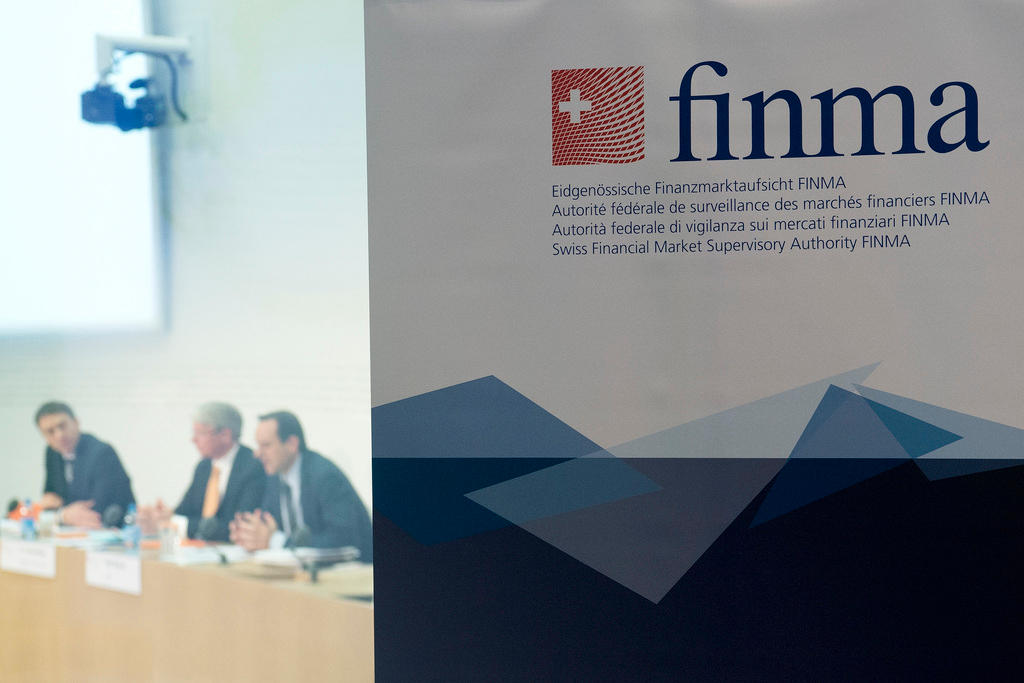FINMA sets tough restrictions on bank bitcoin trading

Cryptoassets like bitcoin should be risk weighted at eight times their market value when banks calculate loss-absorbing capital buffers, according to a confidential letter from the Swiss financial regulator seen by swissinfo.ch.
The Swiss Financial Market Supervisory Authority (FINMAExternal link) has taken no official position on how to merge cryptoassets into Basel III capital requirements or liquidity ratios. But a letter to EXPERTsuisseExternal link, an association representing Swiss trustees and accountants, reveals the regulator’s current thoughts on the issue.
“FINMA has recently received an increasing number of enquiries from banks and securities dealers holding positions in cryptoassets and are subject to capital adequacy requirements, risk distribution regulations and regulations for the calculation of short-term liquidity ratios,” the letter, dated October 15, starts.
Until the Basel Committee on Banking SupervisionExternal link makes global recommendations, FINMA is advising financial players that cryptoassets should be “assigned a flat risk weight of 800% to cover market and credit risks, regardless of whether the positions are held in the banking or trading book”.

More
Blockchain and bank accounts: a Swiss tightrope act
Trading cap
According to experts, a risk weighting of 800% is at the high end of the range, indicating that FINMA considers the asset as volatile. This puts cryptoasset trading at the same level as hedge fund activity. Massive price fluctuations of bitcoin and other cryptocurrencies in the last year may have bottomed out in recent months, but the spectre of volatility stills hangs over the asset class.
Bitcoin currently trades at just over $6,000 (CHF6,000) a unit. But a bank must assume a value of around $50,000 for every bitcoin on its books when calculating the risk-weighted worth of its assets. This means it must put aside a larger chunk of capital to cover potential losses of cryptocurrency positions than most other assets.
In its letter, FINMA suggests that other countries take an even tougher line with risk weighting cryptocurrencies.
FINMA also puts a cap on crypto trading activities of 4% of total capital, when adding together long and short positions. The regulator insists that institutions report when they have reached the limit.
In addition, the regulator says that cryptocurrencies cannot be considered as highly liquid assets when determining liquidity ratios – the amount of cash or easily convertible capital banks must put aside to cover short-term losses.
The guidelines affect cryptoassets held on an institution’s own books as opposed to customer deposits held separately to its balance sheet.
“Encouraging” sign
In addition to players in the traditional financial sector, FINMA’s guidance is also of interest to the growing number of crypto banks setting up in Switzerland, such as the SEBAExternal link banking project, which hopes to win a license to operate full banking services bridging crypto and traditional currencies.
“SEBA acknowledges the guidelines which may be justified for certain models on how crypto assets are handled and held. We believe that the guidelines have a limited impact on SEBA’s business model,” CEO Guido Bühler told swissinfo.ch.
A handful of traditional financial institutions have openly stated that they are offering crypto services or products for clients.
Despite the relatively high hurdles being set to trade in cryptocurrencies, the Bitcoin Association SwitzerlandExternal link reacted positively to the findings.
“It’s encouraging to see banks no longer turning down the increasing number of client requests for crypto services but asking for guidance and providing their input along the way,” BAS stated. “This is the Swiss financial centre’s first step towards moving into the next decade where assets are no longer held in a single, central custody but instead are held on the blockchain.”
FINMA usually makes public its regulatory decisions via circulars. It is unclear exactly how it reached its decision on cryptoassets. The regulator’s letter states that it reached its guidelines after consulting with representatives of the banking industry, including the Swiss Bankers Association (SBA). FINMA, the SBA and EXPERTsuisse declined to comment.
The Basel Committee is next due to meet on November 26-27, when it may have an updateExternal link on its position on cryptocurrencies in the mainstream financial world. FINMA is not expected to make a public statement on the issue until global regulations have been set.
FINMA position on cryptocurrencies
“Some trading activities with virtual currencies require a banking licence and involve ongoing monitoring by FINMA. This is generally the case when an organisation accepts money on a commercial basis from clients and keeps it in its own accounts. The same applies to providers who lodge virtual currency holdings from customers in “wallets” and manage accounts for them. However, no banking licence is required if virtual currency holdings are transferred for secure safekeeping only and if each blockchain-based deposit can be attributed to an individual customer at all times.”

In compliance with the JTI standards
More: SWI swissinfo.ch certified by the Journalism Trust Initiative













You can find an overview of ongoing debates with our journalists here . Please join us!
If you want to start a conversation about a topic raised in this article or want to report factual errors, email us at english@swissinfo.ch.